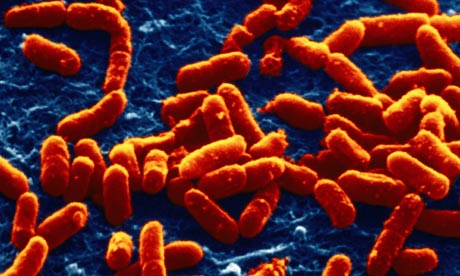Soldato
- Joined
- 7 Jul 2009
- Posts
- 16,234
- Location
- Newcastle/Aberdeen
From: http://www.guardian.co.uk/science/blog/2009/jul/24/bacteria-computer
Discuss. I always knew organic computing would happen some day, but not like this. I was more for the human brain with hundreds of electrodes attached

Computers are evolving – literally. While the tech world argues netbooks vs notebooks, synthetic biologists are leaving traditional computers behind altogether. A team of US scientists have engineered bacteria that can solve complex mathematical problems faster than anything made from silicon.
The research, published today in the Journal of Biological Engineering, proves that bacteria can be used to solve a puzzle known as the Hamiltonian Path Problem. Imagine you want to tour the 10 biggest cities in the UK, starting in London (number 1) and finishing in Bristol (number 10). The solution to the Hamiltonian Path Problem is the the shortest possible route you can take.
This simple problem is surprisingly difficult to solve. There are over 3.5 million possible routes to choose from, and a regular computer must try them out one at a time to find the shortest. Alternatively, a computer made from millions of bacteria can look at every route simultaneously. The biological world also has other advantages. As time goes by, a bacterial computer will actually increase in power as the bacteria reproduce.
Programming such a computer is no easy task, however. The researchers coded a simplified version of the problem, using just three cities, by modifying the DNA of Escherichia coli bacteria. The cities were represented by a combination of genes causing the bacteria to glow red or green, and the possible routes between the cities were explored by the random shuffling of DNA. Bacteria producing the correct answer glowed both colours, turning them yellow.
The experiment worked, and the scientists checked the yellow bacteria's answer by examining their DNA sequence. By using additional genetic differences such as resistance to particular antibiotics, the team believe their method could be expanded to solve problems involving more cities.
This is not the only problem bacteria can solve. The research builds on previous work by the same team, who last year created a bacterial computer to solve the Burnt Pancake Problem. This unusually named conundrum is a mathematical sorting process that can be visualised as a stack of pancakes, all burnt on one side, which must be ordered by size.
In addition to proving the power of bacterial computing, the team have also contributed significantly to the field of synthetic biology. Just as electronic circuits are made from transistors, diodes and other devices, so too are biological circuits. Synthetic biologists have worked together to create the Registry of Standard Biological Parts, and this new research has contributed more than 60 new components to the list.
For more information on the expanding field of synthetic biology, download the latest edition of the Guardian's Science Weekly podcast. Alok Jha and James Randerson were joined in the pod by synthetic biologist Paul Freemont, professor of protein crystallography at Imperial College London, to discuss a future of biological machines.
Discuss. I always knew organic computing would happen some day, but not like this. I was more for the human brain with hundreds of electrodes attached






